Leadership & Management in the Workplace: A Unilever Case Study Report
VerifiedAdded on 2023/06/11
|10
|2745
|276
Case Study
AI Summary
This case study report analyzes leadership and management theories and principles, focusing on their impact on organizational effectiveness and culture within Unilever. It defines leaders and managers, contrasting their roles and skills, and examines leadership theories such as Functional and Transformational leadership, reflecting on their impact on decision-making. The report also emphasizes the importance of organizational culture, illustrating how leadership and management influence culture and performance. It compares leadership and management activities between Unilever and Nestle, highlighting the effects of different styles on decision-making. This document is available on Desklib, a platform offering a wealth of study resources for students.
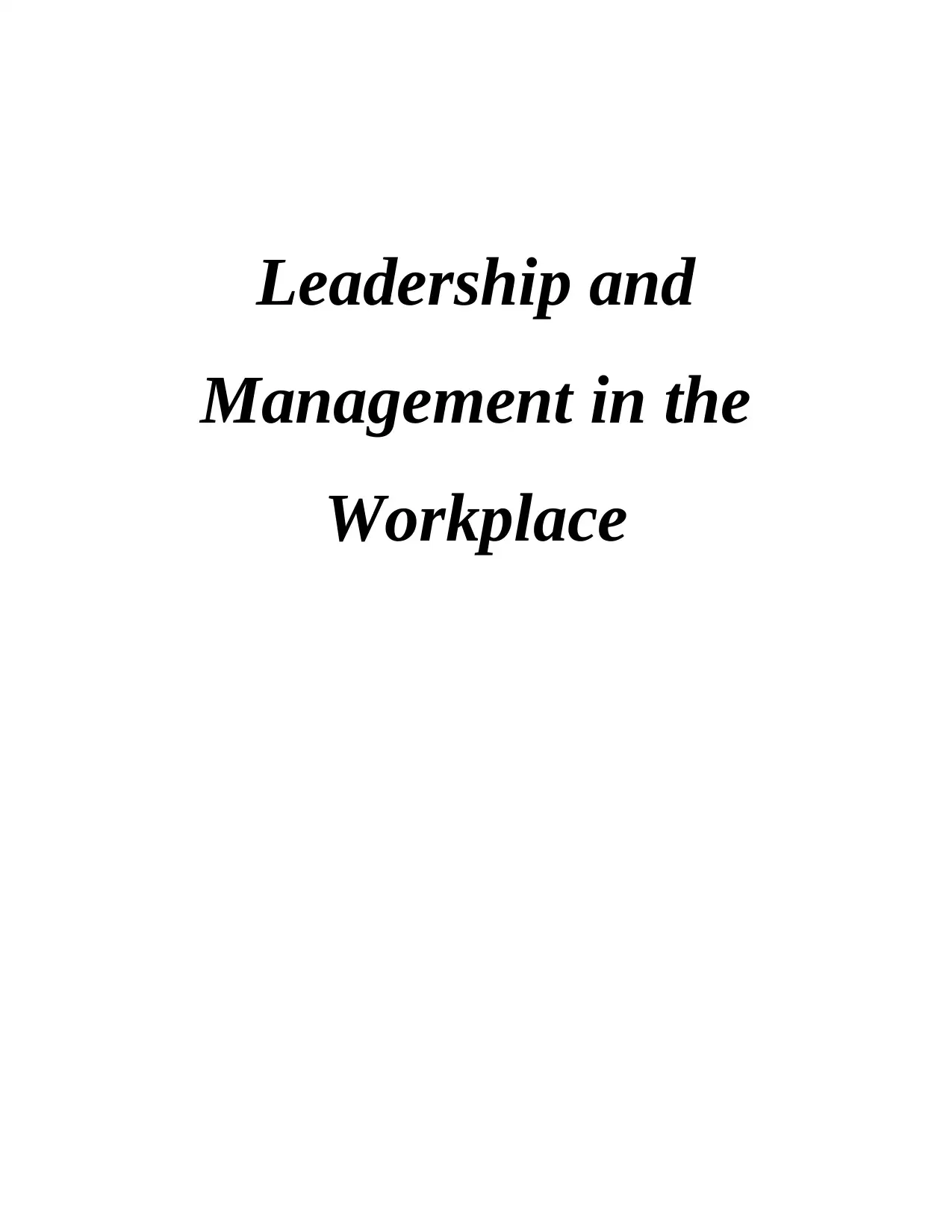
Leadership and
Management in the
Workplace
Management in the
Workplace
Paraphrase This Document
Need a fresh take? Get an instant paraphrase of this document with our AI Paraphraser
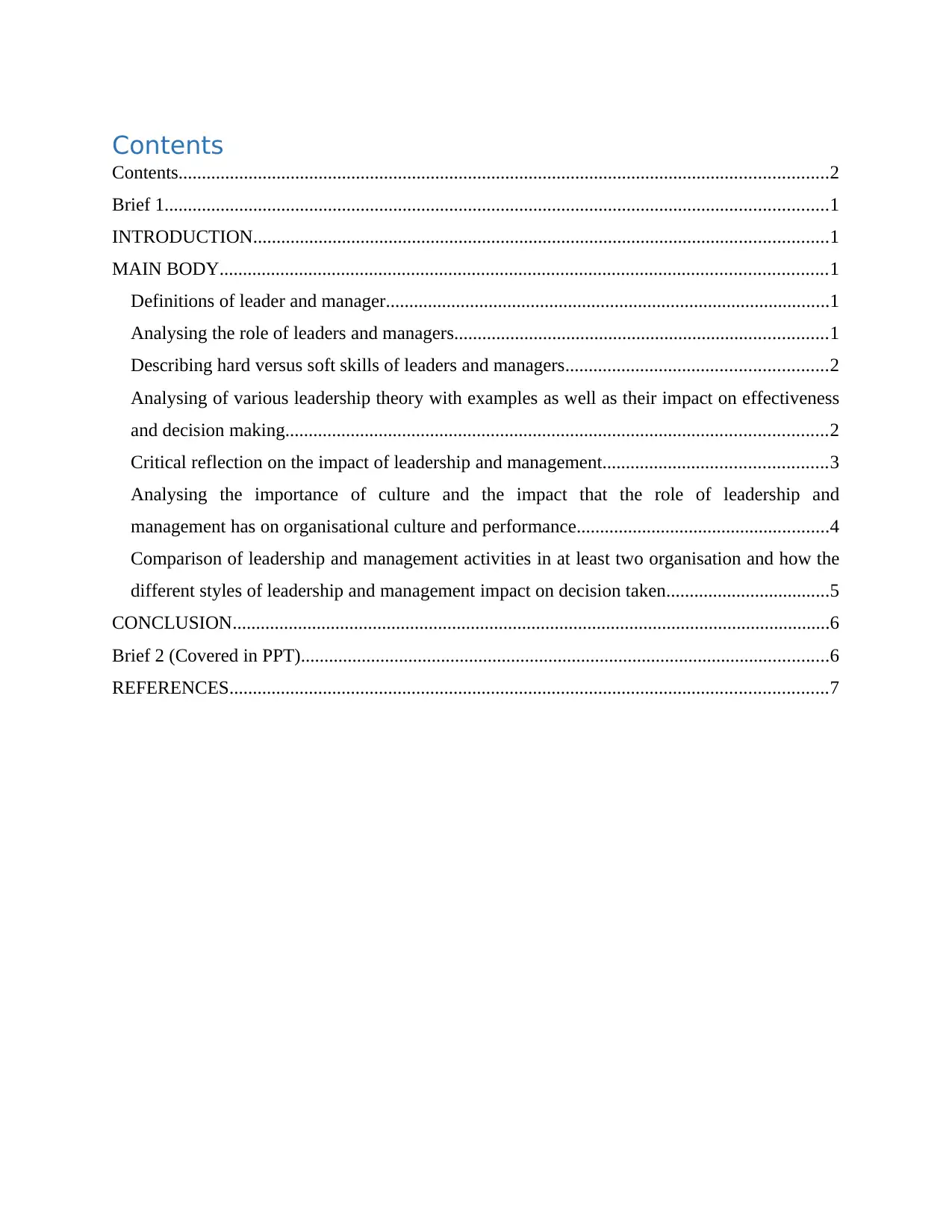
Contents
Contents...........................................................................................................................................2
Brief 1..............................................................................................................................................1
INTRODUCTION...........................................................................................................................1
MAIN BODY..................................................................................................................................1
Definitions of leader and manager...............................................................................................1
Analysing the role of leaders and managers................................................................................1
Describing hard versus soft skills of leaders and managers........................................................2
Analysing of various leadership theory with examples as well as their impact on effectiveness
and decision making....................................................................................................................2
Critical reflection on the impact of leadership and management................................................3
Analysing the importance of culture and the impact that the role of leadership and
management has on organisational culture and performance......................................................4
Comparison of leadership and management activities in at least two organisation and how the
different styles of leadership and management impact on decision taken...................................5
CONCLUSION................................................................................................................................6
Brief 2 (Covered in PPT).................................................................................................................6
REFERENCES................................................................................................................................7
Contents...........................................................................................................................................2
Brief 1..............................................................................................................................................1
INTRODUCTION...........................................................................................................................1
MAIN BODY..................................................................................................................................1
Definitions of leader and manager...............................................................................................1
Analysing the role of leaders and managers................................................................................1
Describing hard versus soft skills of leaders and managers........................................................2
Analysing of various leadership theory with examples as well as their impact on effectiveness
and decision making....................................................................................................................2
Critical reflection on the impact of leadership and management................................................3
Analysing the importance of culture and the impact that the role of leadership and
management has on organisational culture and performance......................................................4
Comparison of leadership and management activities in at least two organisation and how the
different styles of leadership and management impact on decision taken...................................5
CONCLUSION................................................................................................................................6
Brief 2 (Covered in PPT).................................................................................................................6
REFERENCES................................................................................................................................7

⊘ This is a preview!⊘
Do you want full access?
Subscribe today to unlock all pages.

Trusted by 1+ million students worldwide
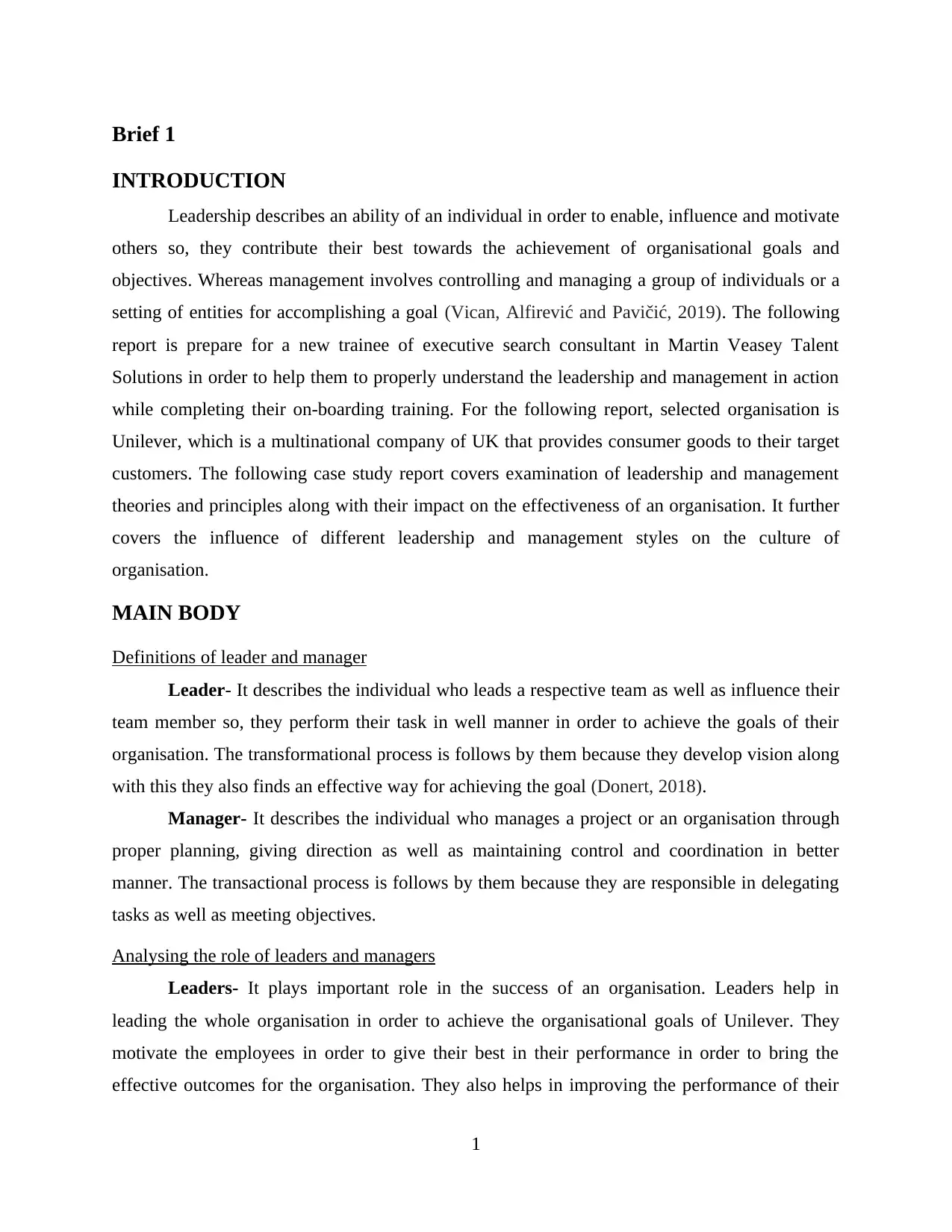
Brief 1
INTRODUCTION
Leadership describes an ability of an individual in order to enable, influence and motivate
others so, they contribute their best towards the achievement of organisational goals and
objectives. Whereas management involves controlling and managing a group of individuals or a
setting of entities for accomplishing a goal (Vican, Alfirević and Pavičić, 2019). The following
report is prepare for a new trainee of executive search consultant in Martin Veasey Talent
Solutions in order to help them to properly understand the leadership and management in action
while completing their on-boarding training. For the following report, selected organisation is
Unilever, which is a multinational company of UK that provides consumer goods to their target
customers. The following case study report covers examination of leadership and management
theories and principles along with their impact on the effectiveness of an organisation. It further
covers the influence of different leadership and management styles on the culture of
organisation.
MAIN BODY
Definitions of leader and manager
Leader- It describes the individual who leads a respective team as well as influence their
team member so, they perform their task in well manner in order to achieve the goals of their
organisation. The transformational process is follows by them because they develop vision along
with this they also finds an effective way for achieving the goal (Donert, 2018).
Manager- It describes the individual who manages a project or an organisation through
proper planning, giving direction as well as maintaining control and coordination in better
manner. The transactional process is follows by them because they are responsible in delegating
tasks as well as meeting objectives.
Analysing the role of leaders and managers
Leaders- It plays important role in the success of an organisation. Leaders help in
leading the whole organisation in order to achieve the organisational goals of Unilever. They
motivate the employees in order to give their best in their performance in order to bring the
effective outcomes for the organisation. They also helps in improving the performance of their
1
INTRODUCTION
Leadership describes an ability of an individual in order to enable, influence and motivate
others so, they contribute their best towards the achievement of organisational goals and
objectives. Whereas management involves controlling and managing a group of individuals or a
setting of entities for accomplishing a goal (Vican, Alfirević and Pavičić, 2019). The following
report is prepare for a new trainee of executive search consultant in Martin Veasey Talent
Solutions in order to help them to properly understand the leadership and management in action
while completing their on-boarding training. For the following report, selected organisation is
Unilever, which is a multinational company of UK that provides consumer goods to their target
customers. The following case study report covers examination of leadership and management
theories and principles along with their impact on the effectiveness of an organisation. It further
covers the influence of different leadership and management styles on the culture of
organisation.
MAIN BODY
Definitions of leader and manager
Leader- It describes the individual who leads a respective team as well as influence their
team member so, they perform their task in well manner in order to achieve the goals of their
organisation. The transformational process is follows by them because they develop vision along
with this they also finds an effective way for achieving the goal (Donert, 2018).
Manager- It describes the individual who manages a project or an organisation through
proper planning, giving direction as well as maintaining control and coordination in better
manner. The transactional process is follows by them because they are responsible in delegating
tasks as well as meeting objectives.
Analysing the role of leaders and managers
Leaders- It plays important role in the success of an organisation. Leaders help in
leading the whole organisation in order to achieve the organisational goals of Unilever. They
motivate the employees in order to give their best in their performance in order to bring the
effective outcomes for the organisation. They also helps in improving the performance of their
1
Paraphrase This Document
Need a fresh take? Get an instant paraphrase of this document with our AI Paraphraser
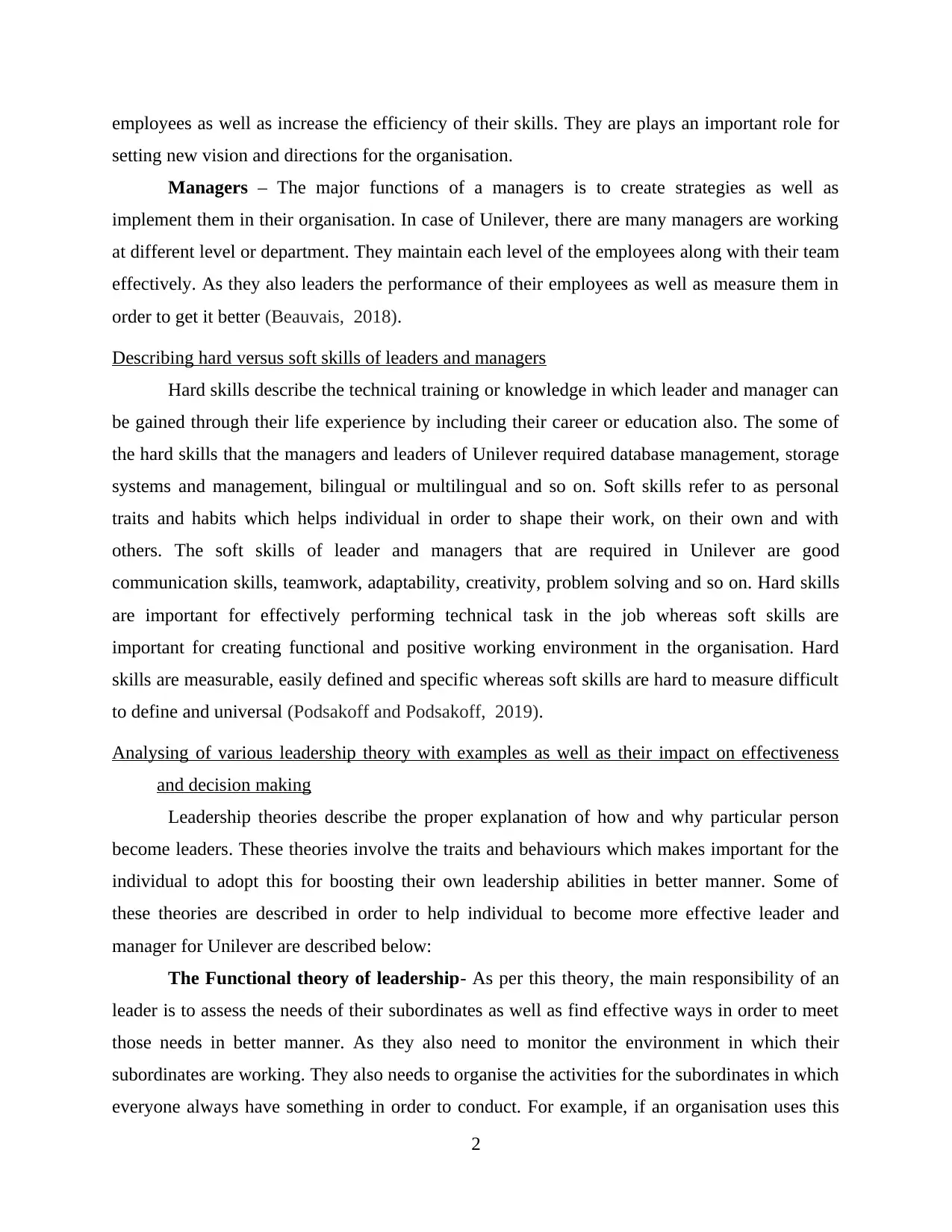
employees as well as increase the efficiency of their skills. They are plays an important role for
setting new vision and directions for the organisation.
Managers – The major functions of a managers is to create strategies as well as
implement them in their organisation. In case of Unilever, there are many managers are working
at different level or department. They maintain each level of the employees along with their team
effectively. As they also leaders the performance of their employees as well as measure them in
order to get it better (Beauvais, 2018).
Describing hard versus soft skills of leaders and managers
Hard skills describe the technical training or knowledge in which leader and manager can
be gained through their life experience by including their career or education also. The some of
the hard skills that the managers and leaders of Unilever required database management, storage
systems and management, bilingual or multilingual and so on. Soft skills refer to as personal
traits and habits which helps individual in order to shape their work, on their own and with
others. The soft skills of leader and managers that are required in Unilever are good
communication skills, teamwork, adaptability, creativity, problem solving and so on. Hard skills
are important for effectively performing technical task in the job whereas soft skills are
important for creating functional and positive working environment in the organisation. Hard
skills are measurable, easily defined and specific whereas soft skills are hard to measure difficult
to define and universal (Podsakoff and Podsakoff, 2019).
Analysing of various leadership theory with examples as well as their impact on effectiveness
and decision making
Leadership theories describe the proper explanation of how and why particular person
become leaders. These theories involve the traits and behaviours which makes important for the
individual to adopt this for boosting their own leadership abilities in better manner. Some of
these theories are described in order to help individual to become more effective leader and
manager for Unilever are described below:
The Functional theory of leadership- As per this theory, the main responsibility of an
leader is to assess the needs of their subordinates as well as find effective ways in order to meet
those needs in better manner. As they also need to monitor the environment in which their
subordinates are working. They also needs to organise the activities for the subordinates in which
everyone always have something in order to conduct. For example, if an organisation uses this
2
setting new vision and directions for the organisation.
Managers – The major functions of a managers is to create strategies as well as
implement them in their organisation. In case of Unilever, there are many managers are working
at different level or department. They maintain each level of the employees along with their team
effectively. As they also leaders the performance of their employees as well as measure them in
order to get it better (Beauvais, 2018).
Describing hard versus soft skills of leaders and managers
Hard skills describe the technical training or knowledge in which leader and manager can
be gained through their life experience by including their career or education also. The some of
the hard skills that the managers and leaders of Unilever required database management, storage
systems and management, bilingual or multilingual and so on. Soft skills refer to as personal
traits and habits which helps individual in order to shape their work, on their own and with
others. The soft skills of leader and managers that are required in Unilever are good
communication skills, teamwork, adaptability, creativity, problem solving and so on. Hard skills
are important for effectively performing technical task in the job whereas soft skills are
important for creating functional and positive working environment in the organisation. Hard
skills are measurable, easily defined and specific whereas soft skills are hard to measure difficult
to define and universal (Podsakoff and Podsakoff, 2019).
Analysing of various leadership theory with examples as well as their impact on effectiveness
and decision making
Leadership theories describe the proper explanation of how and why particular person
become leaders. These theories involve the traits and behaviours which makes important for the
individual to adopt this for boosting their own leadership abilities in better manner. Some of
these theories are described in order to help individual to become more effective leader and
manager for Unilever are described below:
The Functional theory of leadership- As per this theory, the main responsibility of an
leader is to assess the needs of their subordinates as well as find effective ways in order to meet
those needs in better manner. As they also need to monitor the environment in which their
subordinates are working. They also needs to organise the activities for the subordinates in which
everyone always have something in order to conduct. For example, if an organisation uses this
2
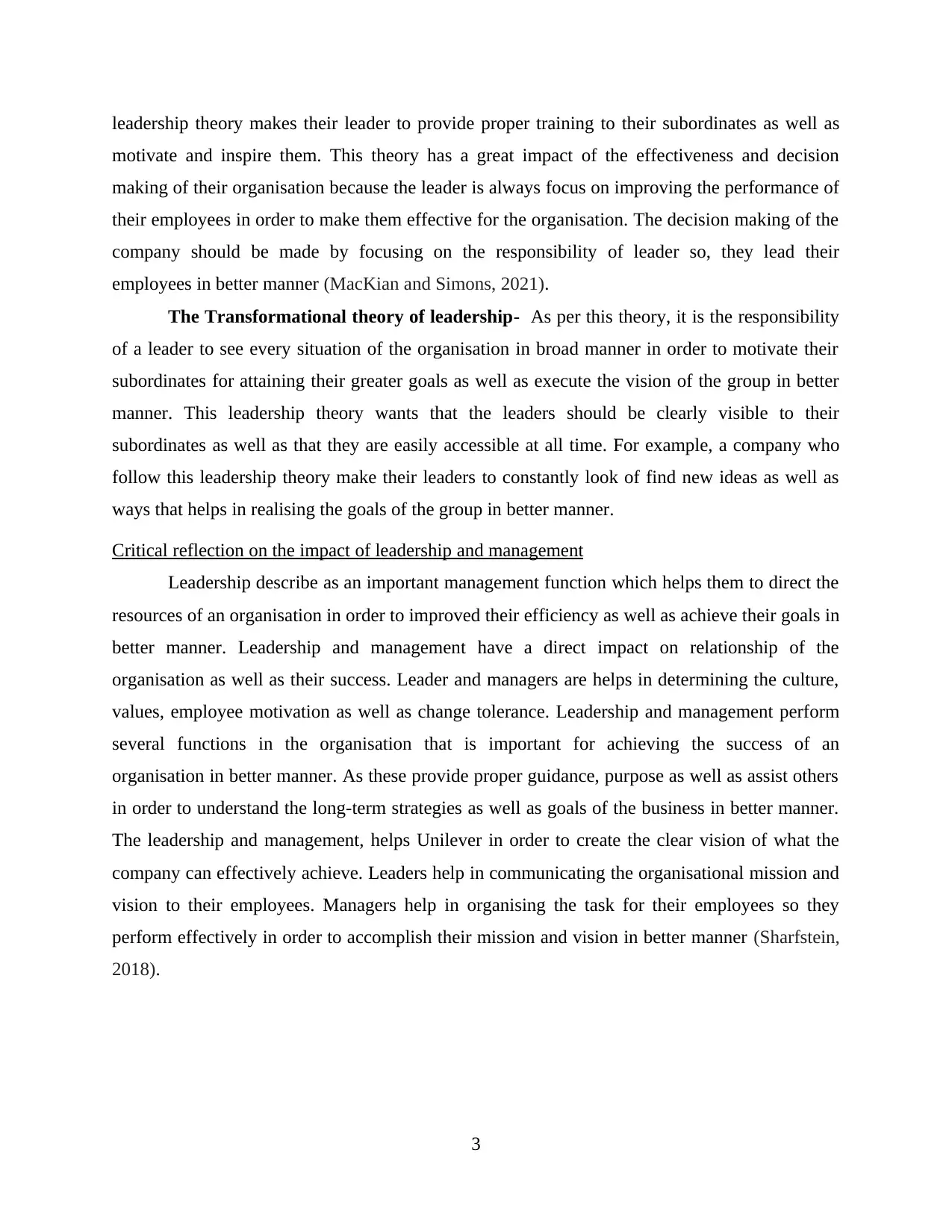
leadership theory makes their leader to provide proper training to their subordinates as well as
motivate and inspire them. This theory has a great impact of the effectiveness and decision
making of their organisation because the leader is always focus on improving the performance of
their employees in order to make them effective for the organisation. The decision making of the
company should be made by focusing on the responsibility of leader so, they lead their
employees in better manner (MacKian and Simons, 2021).
The Transformational theory of leadership- As per this theory, it is the responsibility
of a leader to see every situation of the organisation in broad manner in order to motivate their
subordinates for attaining their greater goals as well as execute the vision of the group in better
manner. This leadership theory wants that the leaders should be clearly visible to their
subordinates as well as that they are easily accessible at all time. For example, a company who
follow this leadership theory make their leaders to constantly look of find new ideas as well as
ways that helps in realising the goals of the group in better manner.
Critical reflection on the impact of leadership and management
Leadership describe as an important management function which helps them to direct the
resources of an organisation in order to improved their efficiency as well as achieve their goals in
better manner. Leadership and management have a direct impact on relationship of the
organisation as well as their success. Leader and managers are helps in determining the culture,
values, employee motivation as well as change tolerance. Leadership and management perform
several functions in the organisation that is important for achieving the success of an
organisation in better manner. As these provide proper guidance, purpose as well as assist others
in order to understand the long-term strategies as well as goals of the business in better manner.
The leadership and management, helps Unilever in order to create the clear vision of what the
company can effectively achieve. Leaders help in communicating the organisational mission and
vision to their employees. Managers help in organising the task for their employees so they
perform effectively in order to accomplish their mission and vision in better manner (Sharfstein,
2018).
3
motivate and inspire them. This theory has a great impact of the effectiveness and decision
making of their organisation because the leader is always focus on improving the performance of
their employees in order to make them effective for the organisation. The decision making of the
company should be made by focusing on the responsibility of leader so, they lead their
employees in better manner (MacKian and Simons, 2021).
The Transformational theory of leadership- As per this theory, it is the responsibility
of a leader to see every situation of the organisation in broad manner in order to motivate their
subordinates for attaining their greater goals as well as execute the vision of the group in better
manner. This leadership theory wants that the leaders should be clearly visible to their
subordinates as well as that they are easily accessible at all time. For example, a company who
follow this leadership theory make their leaders to constantly look of find new ideas as well as
ways that helps in realising the goals of the group in better manner.
Critical reflection on the impact of leadership and management
Leadership describe as an important management function which helps them to direct the
resources of an organisation in order to improved their efficiency as well as achieve their goals in
better manner. Leadership and management have a direct impact on relationship of the
organisation as well as their success. Leader and managers are helps in determining the culture,
values, employee motivation as well as change tolerance. Leadership and management perform
several functions in the organisation that is important for achieving the success of an
organisation in better manner. As these provide proper guidance, purpose as well as assist others
in order to understand the long-term strategies as well as goals of the business in better manner.
The leadership and management, helps Unilever in order to create the clear vision of what the
company can effectively achieve. Leaders help in communicating the organisational mission and
vision to their employees. Managers help in organising the task for their employees so they
perform effectively in order to accomplish their mission and vision in better manner (Sharfstein,
2018).
3
⊘ This is a preview!⊘
Do you want full access?
Subscribe today to unlock all pages.

Trusted by 1+ million students worldwide
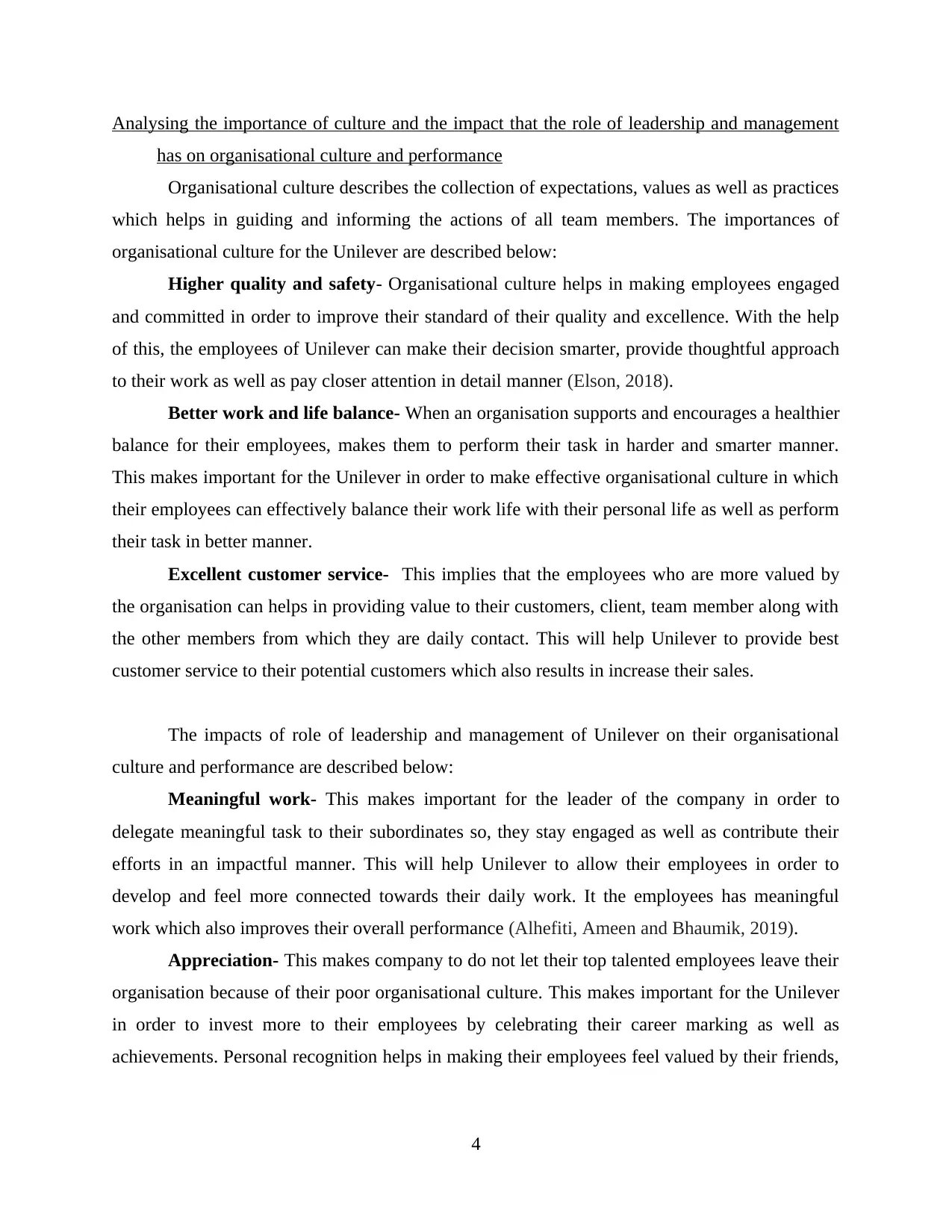
Analysing the importance of culture and the impact that the role of leadership and management
has on organisational culture and performance
Organisational culture describes the collection of expectations, values as well as practices
which helps in guiding and informing the actions of all team members. The importances of
organisational culture for the Unilever are described below:
Higher quality and safety- Organisational culture helps in making employees engaged
and committed in order to improve their standard of their quality and excellence. With the help
of this, the employees of Unilever can make their decision smarter, provide thoughtful approach
to their work as well as pay closer attention in detail manner (Elson, 2018).
Better work and life balance- When an organisation supports and encourages a healthier
balance for their employees, makes them to perform their task in harder and smarter manner.
This makes important for the Unilever in order to make effective organisational culture in which
their employees can effectively balance their work life with their personal life as well as perform
their task in better manner.
Excellent customer service- This implies that the employees who are more valued by
the organisation can helps in providing value to their customers, client, team member along with
the other members from which they are daily contact. This will help Unilever to provide best
customer service to their potential customers which also results in increase their sales.
The impacts of role of leadership and management of Unilever on their organisational
culture and performance are described below:
Meaningful work- This makes important for the leader of the company in order to
delegate meaningful task to their subordinates so, they stay engaged as well as contribute their
efforts in an impactful manner. This will help Unilever to allow their employees in order to
develop and feel more connected towards their daily work. It the employees has meaningful
work which also improves their overall performance (Alhefiti, Ameen and Bhaumik, 2019).
Appreciation- This makes company to do not let their top talented employees leave their
organisation because of their poor organisational culture. This makes important for the Unilever
in order to invest more to their employees by celebrating their career marking as well as
achievements. Personal recognition helps in making their employees feel valued by their friends,
4
has on organisational culture and performance
Organisational culture describes the collection of expectations, values as well as practices
which helps in guiding and informing the actions of all team members. The importances of
organisational culture for the Unilever are described below:
Higher quality and safety- Organisational culture helps in making employees engaged
and committed in order to improve their standard of their quality and excellence. With the help
of this, the employees of Unilever can make their decision smarter, provide thoughtful approach
to their work as well as pay closer attention in detail manner (Elson, 2018).
Better work and life balance- When an organisation supports and encourages a healthier
balance for their employees, makes them to perform their task in harder and smarter manner.
This makes important for the Unilever in order to make effective organisational culture in which
their employees can effectively balance their work life with their personal life as well as perform
their task in better manner.
Excellent customer service- This implies that the employees who are more valued by
the organisation can helps in providing value to their customers, client, team member along with
the other members from which they are daily contact. This will help Unilever to provide best
customer service to their potential customers which also results in increase their sales.
The impacts of role of leadership and management of Unilever on their organisational
culture and performance are described below:
Meaningful work- This makes important for the leader of the company in order to
delegate meaningful task to their subordinates so, they stay engaged as well as contribute their
efforts in an impactful manner. This will help Unilever to allow their employees in order to
develop and feel more connected towards their daily work. It the employees has meaningful
work which also improves their overall performance (Alhefiti, Ameen and Bhaumik, 2019).
Appreciation- This makes company to do not let their top talented employees leave their
organisation because of their poor organisational culture. This makes important for the Unilever
in order to invest more to their employees by celebrating their career marking as well as
achievements. Personal recognition helps in making their employees feel valued by their friends,
4
Paraphrase This Document
Need a fresh take? Get an instant paraphrase of this document with our AI Paraphraser
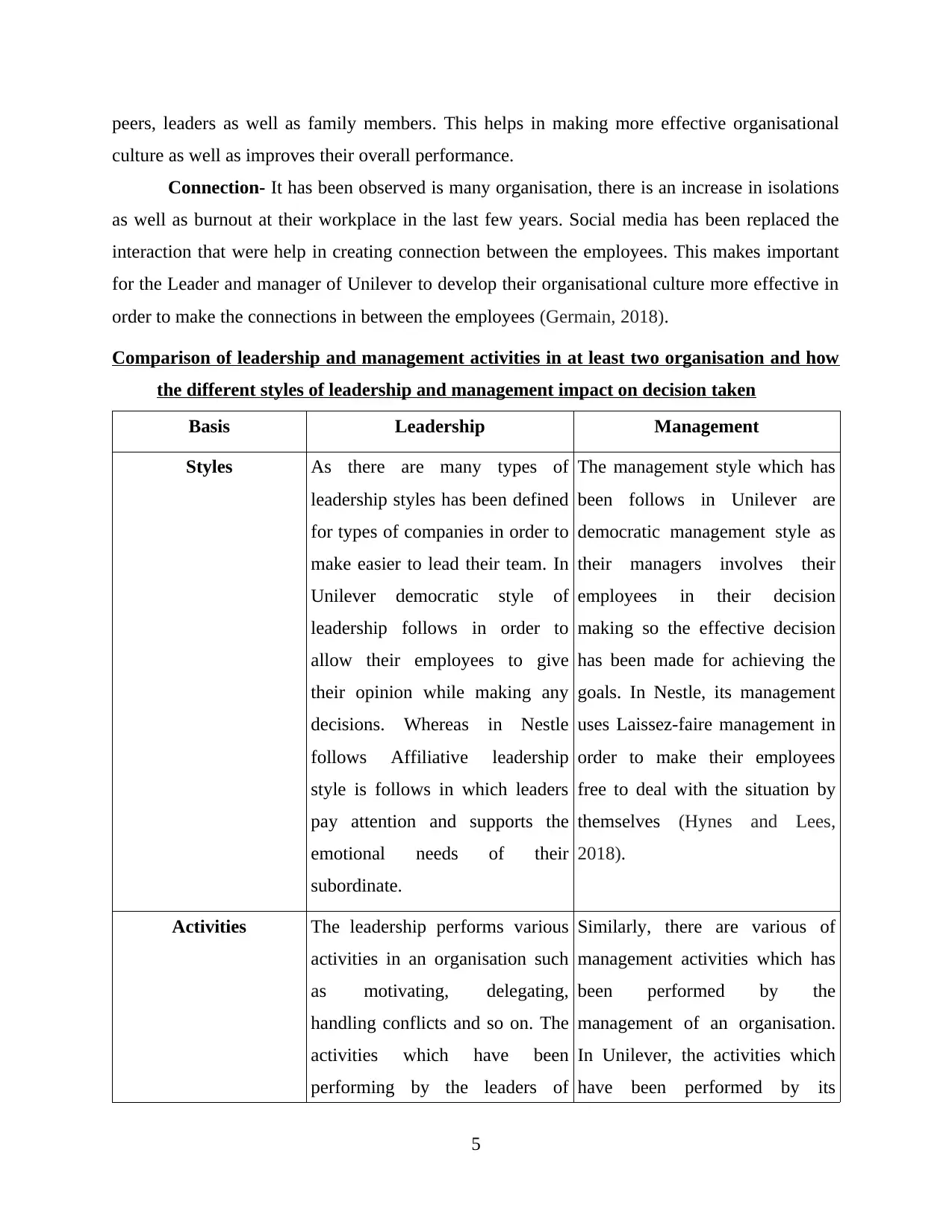
peers, leaders as well as family members. This helps in making more effective organisational
culture as well as improves their overall performance.
Connection- It has been observed is many organisation, there is an increase in isolations
as well as burnout at their workplace in the last few years. Social media has been replaced the
interaction that were help in creating connection between the employees. This makes important
for the Leader and manager of Unilever to develop their organisational culture more effective in
order to make the connections in between the employees (Germain, 2018).
Comparison of leadership and management activities in at least two organisation and how
the different styles of leadership and management impact on decision taken
Basis Leadership Management
Styles As there are many types of
leadership styles has been defined
for types of companies in order to
make easier to lead their team. In
Unilever democratic style of
leadership follows in order to
allow their employees to give
their opinion while making any
decisions. Whereas in Nestle
follows Affiliative leadership
style is follows in which leaders
pay attention and supports the
emotional needs of their
subordinate.
The management style which has
been follows in Unilever are
democratic management style as
their managers involves their
employees in their decision
making so the effective decision
has been made for achieving the
goals. In Nestle, its management
uses Laissez-faire management in
order to make their employees
free to deal with the situation by
themselves (Hynes and Lees,
2018).
Activities The leadership performs various
activities in an organisation such
as motivating, delegating,
handling conflicts and so on. The
activities which have been
performing by the leaders of
Similarly, there are various of
management activities which has
been performed by the
management of an organisation.
In Unilever, the activities which
have been performed by its
5
culture as well as improves their overall performance.
Connection- It has been observed is many organisation, there is an increase in isolations
as well as burnout at their workplace in the last few years. Social media has been replaced the
interaction that were help in creating connection between the employees. This makes important
for the Leader and manager of Unilever to develop their organisational culture more effective in
order to make the connections in between the employees (Germain, 2018).
Comparison of leadership and management activities in at least two organisation and how
the different styles of leadership and management impact on decision taken
Basis Leadership Management
Styles As there are many types of
leadership styles has been defined
for types of companies in order to
make easier to lead their team. In
Unilever democratic style of
leadership follows in order to
allow their employees to give
their opinion while making any
decisions. Whereas in Nestle
follows Affiliative leadership
style is follows in which leaders
pay attention and supports the
emotional needs of their
subordinate.
The management style which has
been follows in Unilever are
democratic management style as
their managers involves their
employees in their decision
making so the effective decision
has been made for achieving the
goals. In Nestle, its management
uses Laissez-faire management in
order to make their employees
free to deal with the situation by
themselves (Hynes and Lees,
2018).
Activities The leadership performs various
activities in an organisation such
as motivating, delegating,
handling conflicts and so on. The
activities which have been
performing by the leaders of
Similarly, there are various of
management activities which has
been performed by the
management of an organisation.
In Unilever, the activities which
have been performed by its
5
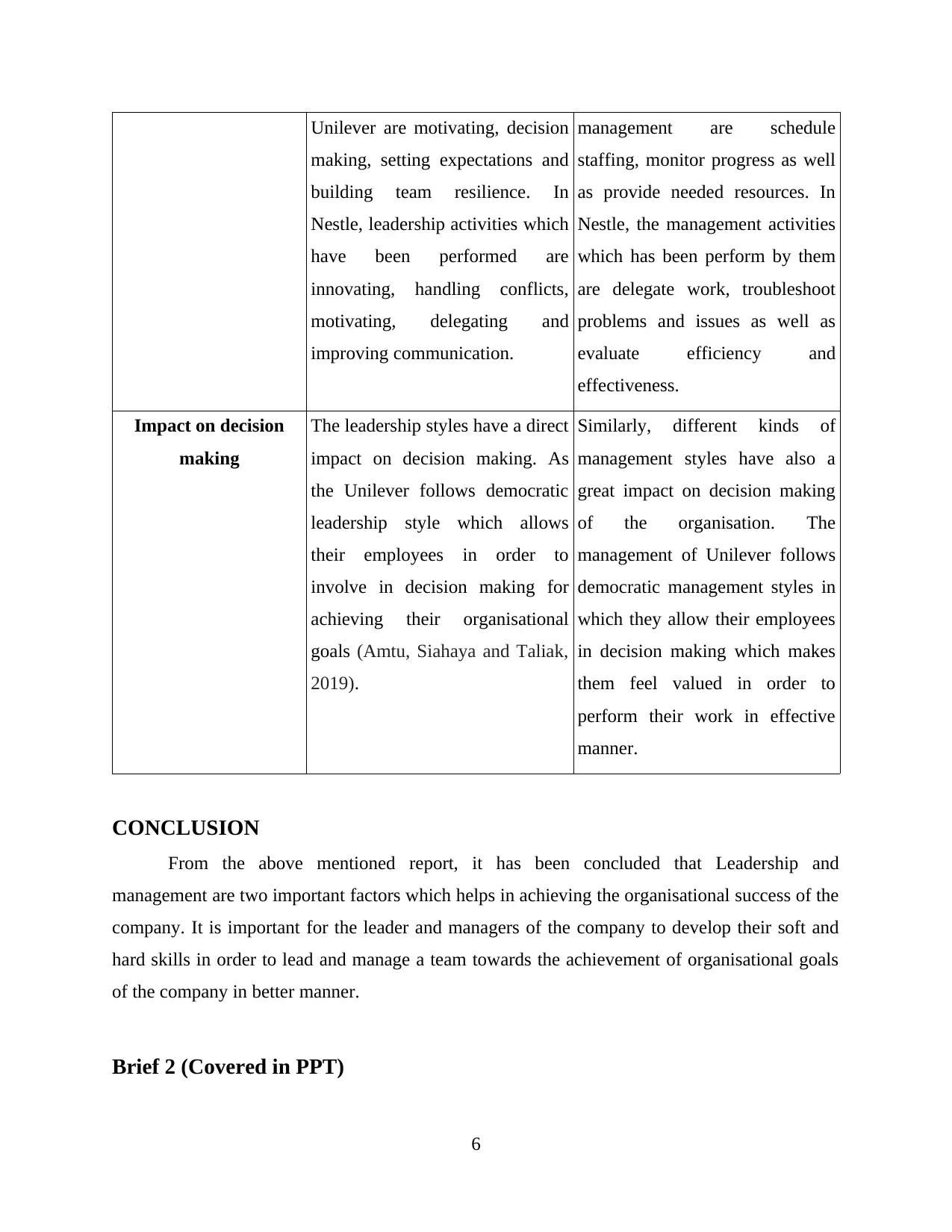
Unilever are motivating, decision
making, setting expectations and
building team resilience. In
Nestle, leadership activities which
have been performed are
innovating, handling conflicts,
motivating, delegating and
improving communication.
management are schedule
staffing, monitor progress as well
as provide needed resources. In
Nestle, the management activities
which has been perform by them
are delegate work, troubleshoot
problems and issues as well as
evaluate efficiency and
effectiveness.
Impact on decision
making
The leadership styles have a direct
impact on decision making. As
the Unilever follows democratic
leadership style which allows
their employees in order to
involve in decision making for
achieving their organisational
goals (Amtu, Siahaya and Taliak,
2019).
Similarly, different kinds of
management styles have also a
great impact on decision making
of the organisation. The
management of Unilever follows
democratic management styles in
which they allow their employees
in decision making which makes
them feel valued in order to
perform their work in effective
manner.
CONCLUSION
From the above mentioned report, it has been concluded that Leadership and
management are two important factors which helps in achieving the organisational success of the
company. It is important for the leader and managers of the company to develop their soft and
hard skills in order to lead and manage a team towards the achievement of organisational goals
of the company in better manner.
Brief 2 (Covered in PPT)
6
making, setting expectations and
building team resilience. In
Nestle, leadership activities which
have been performed are
innovating, handling conflicts,
motivating, delegating and
improving communication.
management are schedule
staffing, monitor progress as well
as provide needed resources. In
Nestle, the management activities
which has been perform by them
are delegate work, troubleshoot
problems and issues as well as
evaluate efficiency and
effectiveness.
Impact on decision
making
The leadership styles have a direct
impact on decision making. As
the Unilever follows democratic
leadership style which allows
their employees in order to
involve in decision making for
achieving their organisational
goals (Amtu, Siahaya and Taliak,
2019).
Similarly, different kinds of
management styles have also a
great impact on decision making
of the organisation. The
management of Unilever follows
democratic management styles in
which they allow their employees
in decision making which makes
them feel valued in order to
perform their work in effective
manner.
CONCLUSION
From the above mentioned report, it has been concluded that Leadership and
management are two important factors which helps in achieving the organisational success of the
company. It is important for the leader and managers of the company to develop their soft and
hard skills in order to lead and manage a team towards the achievement of organisational goals
of the company in better manner.
Brief 2 (Covered in PPT)
6
⊘ This is a preview!⊘
Do you want full access?
Subscribe today to unlock all pages.

Trusted by 1+ million students worldwide
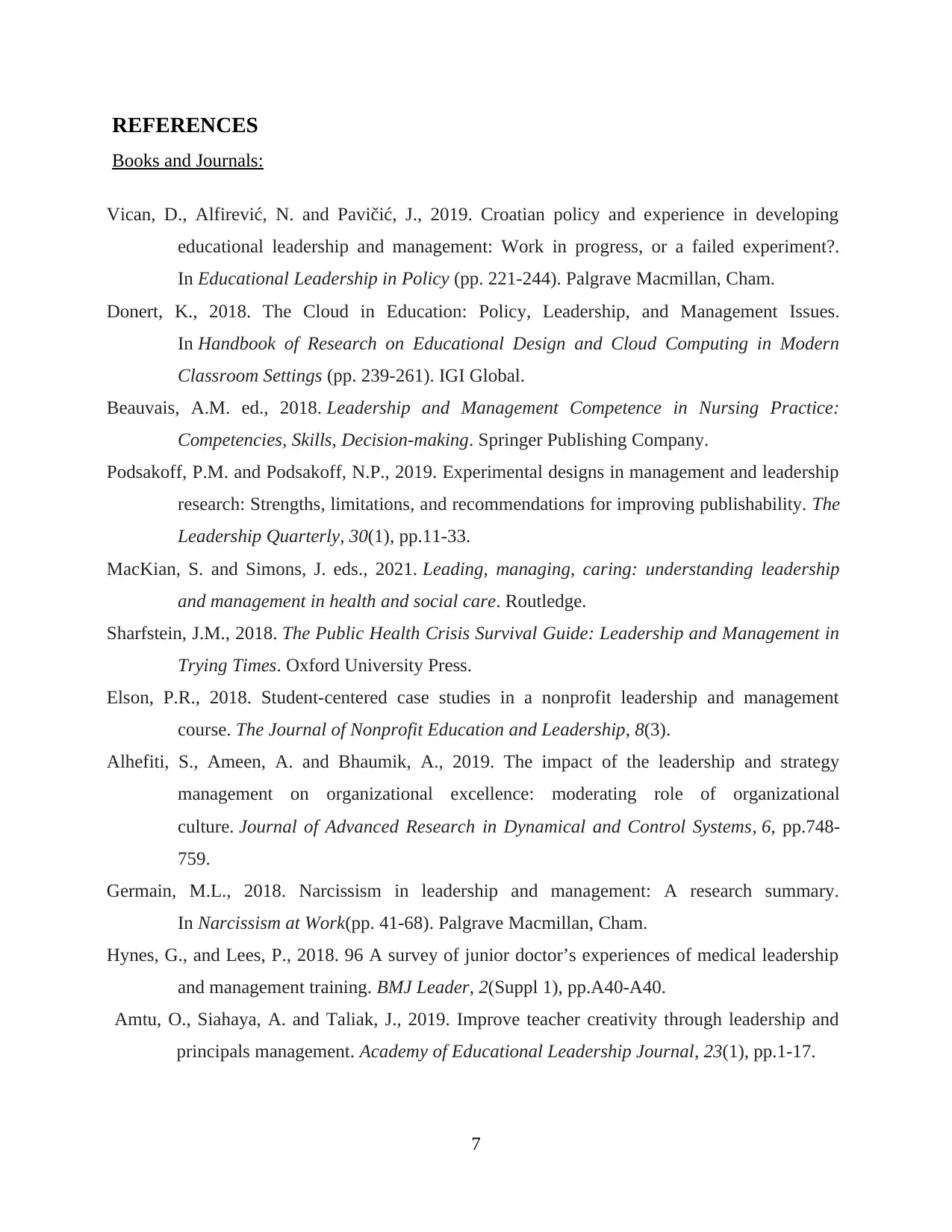
REFERENCES
Books and Journals:
Vican, D., Alfirević, N. and Pavičić, J., 2019. Croatian policy and experience in developing
educational leadership and management: Work in progress, or a failed experiment?.
In Educational Leadership in Policy (pp. 221-244). Palgrave Macmillan, Cham.
Donert, K., 2018. The Cloud in Education: Policy, Leadership, and Management Issues.
In Handbook of Research on Educational Design and Cloud Computing in Modern
Classroom Settings (pp. 239-261). IGI Global.
Beauvais, A.M. ed., 2018. Leadership and Management Competence in Nursing Practice:
Competencies, Skills, Decision-making. Springer Publishing Company.
Podsakoff, P.M. and Podsakoff, N.P., 2019. Experimental designs in management and leadership
research: Strengths, limitations, and recommendations for improving publishability. The
Leadership Quarterly, 30(1), pp.11-33.
MacKian, S. and Simons, J. eds., 2021. Leading, managing, caring: understanding leadership
and management in health and social care. Routledge.
Sharfstein, J.M., 2018. The Public Health Crisis Survival Guide: Leadership and Management in
Trying Times. Oxford University Press.
Elson, P.R., 2018. Student-centered case studies in a nonprofit leadership and management
course. The Journal of Nonprofit Education and Leadership, 8(3).
Alhefiti, S., Ameen, A. and Bhaumik, A., 2019. The impact of the leadership and strategy
management on organizational excellence: moderating role of organizational
culture. Journal of Advanced Research in Dynamical and Control Systems, 6, pp.748-
759.
Germain, M.L., 2018. Narcissism in leadership and management: A research summary.
In Narcissism at Work(pp. 41-68). Palgrave Macmillan, Cham.
Hynes, G., and Lees, P., 2018. 96 A survey of junior doctor’s experiences of medical leadership
and management training. BMJ Leader, 2(Suppl 1), pp.A40-A40.
Amtu, O., Siahaya, A. and Taliak, J., 2019. Improve teacher creativity through leadership and
principals management. Academy of Educational Leadership Journal, 23(1), pp.1-17.
7
Books and Journals:
Vican, D., Alfirević, N. and Pavičić, J., 2019. Croatian policy and experience in developing
educational leadership and management: Work in progress, or a failed experiment?.
In Educational Leadership in Policy (pp. 221-244). Palgrave Macmillan, Cham.
Donert, K., 2018. The Cloud in Education: Policy, Leadership, and Management Issues.
In Handbook of Research on Educational Design and Cloud Computing in Modern
Classroom Settings (pp. 239-261). IGI Global.
Beauvais, A.M. ed., 2018. Leadership and Management Competence in Nursing Practice:
Competencies, Skills, Decision-making. Springer Publishing Company.
Podsakoff, P.M. and Podsakoff, N.P., 2019. Experimental designs in management and leadership
research: Strengths, limitations, and recommendations for improving publishability. The
Leadership Quarterly, 30(1), pp.11-33.
MacKian, S. and Simons, J. eds., 2021. Leading, managing, caring: understanding leadership
and management in health and social care. Routledge.
Sharfstein, J.M., 2018. The Public Health Crisis Survival Guide: Leadership and Management in
Trying Times. Oxford University Press.
Elson, P.R., 2018. Student-centered case studies in a nonprofit leadership and management
course. The Journal of Nonprofit Education and Leadership, 8(3).
Alhefiti, S., Ameen, A. and Bhaumik, A., 2019. The impact of the leadership and strategy
management on organizational excellence: moderating role of organizational
culture. Journal of Advanced Research in Dynamical and Control Systems, 6, pp.748-
759.
Germain, M.L., 2018. Narcissism in leadership and management: A research summary.
In Narcissism at Work(pp. 41-68). Palgrave Macmillan, Cham.
Hynes, G., and Lees, P., 2018. 96 A survey of junior doctor’s experiences of medical leadership
and management training. BMJ Leader, 2(Suppl 1), pp.A40-A40.
Amtu, O., Siahaya, A. and Taliak, J., 2019. Improve teacher creativity through leadership and
principals management. Academy of Educational Leadership Journal, 23(1), pp.1-17.
7
1 out of 10
Related Documents
Your All-in-One AI-Powered Toolkit for Academic Success.
+13062052269
info@desklib.com
Available 24*7 on WhatsApp / Email
![[object Object]](/_next/static/media/star-bottom.7253800d.svg)
Unlock your academic potential
Copyright © 2020–2026 A2Z Services. All Rights Reserved. Developed and managed by ZUCOL.




